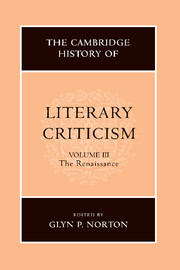Book contents
- Frontmatter
- Introduction
- READING AND INTERPRETATION: AN EMERGING DISCOURSE OF POETICS
- POETICS
- THEORIES OF PROSE FICTION
- CONTEXTS OF CRITICISM: METROPOLITAN CULTURE AND SOCIO-LITERARY ENVIRONMENTS
- VOICES OF DISSENT
- STRUCTURES OF THOUGHT
- 45 Renaissance Neoplatonism
- 46 Cosmography and poetics
- 47 Natural philosophy and the ‘new science’
- 48 Stoicism and Epicureanism: philosophical revival and literary repercussions
- 49 Calvinism and post-Tridentine developments
- 50 Port-Royal and Jansenism
- NEOCLASSICAL ISSUES: BEAUTY, JUDGEMENT, PERSUASION, POLEMICS
- A SURVEY OF NATIONAL DEVELOPMENTS
- Bibliography
- Index
- References
50 - Port-Royal and Jansenism
from STRUCTURES OF THOUGHT
Published online by Cambridge University Press: 28 March 2008
- Frontmatter
- Introduction
- READING AND INTERPRETATION: AN EMERGING DISCOURSE OF POETICS
- POETICS
- THEORIES OF PROSE FICTION
- CONTEXTS OF CRITICISM: METROPOLITAN CULTURE AND SOCIO-LITERARY ENVIRONMENTS
- VOICES OF DISSENT
- STRUCTURES OF THOUGHT
- 45 Renaissance Neoplatonism
- 46 Cosmography and poetics
- 47 Natural philosophy and the ‘new science’
- 48 Stoicism and Epicureanism: philosophical revival and literary repercussions
- 49 Calvinism and post-Tridentine developments
- 50 Port-Royal and Jansenism
- NEOCLASSICAL ISSUES: BEAUTY, JUDGEMENT, PERSUASION, POLEMICS
- A SURVEY OF NATIONAL DEVELOPMENTS
- Bibliography
- Index
- References
Summary
The terms ‘Port-Royal’ and ‘Jansenism’ serve in different ways as metonyms for the (originally theological) ethos of Augustinian pessimism which dominated a significant part of French thought and writing in the later part of the seventeenth century. Port-Royal was the name of two convents: one in the Vallée de Chevreuse, near Paris (Port-Royal-des-Champs), now in ruins; and the other in the city (Port-Royal-de-Paris), currently a hospital. The communities associated with the two sites were, first, an order of Cistercian nuns, reformed by Angélique Arnauld, who had become abbess in 1602, and of which Jean Duvergier de Hauranne, abbé de Saint-Cyran and student contemporary of Jansen, became spiritual director in 1634, following the nuns' move to Paris in 1625–6. Secondly, a group of laymen, the so-called ‘solitaires’ or ‘Messieurs de Port-Royal’, who occupied the rural convent from 1637, and who founded in the vicinity a series of respected schools (‘les petites écoles’), whose most celebrated pupil was Jean Racine. The term ‘Jansenism’ stems from the name of the bishop of Ypres, Cornelius (gallicized Corneille) Jansen, whose seminal (posthumously published) work, the Augustinus (1640), provided the principal theological point of reference for the movement. Neither term is fully definitional or comprehensive; but both have to some extent become interchangeable shorthands.
Taken first at a theological level, the current of Augustinian pessimism was a phenomenon associated with the Catholic (or Counter-) Reformation which, in its various (and on occasion conflicting) manifestations, replied to or, in this case, arguably reflected the Protestant Reformation of the previous century.
- Type
- Chapter
- Information
- The Cambridge History of Literary Criticism , pp. 475 - 484Publisher: Cambridge University PressPrint publication year: 1999



